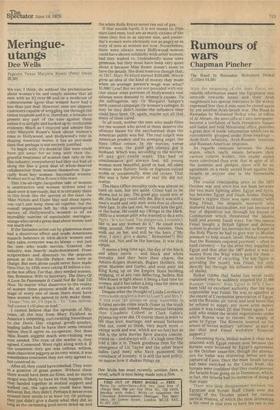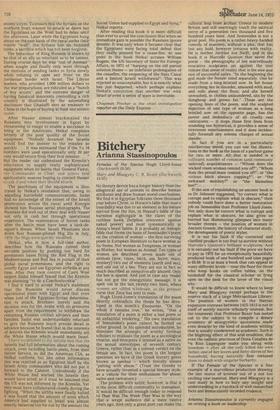Rumours of wars
Chapman Pincher
The Road to Ramadan Mohamed Heikal (Collins £4.50) With the reopening of the Suez Canal any reliable information about the Egyptians' real attitude towards Israel and their Arab neighbours has special relevance to the widely expressed fear that it may soon be closed again by yet another Arab-Israeli war. The Road to Ramadan by Mohamed Heikal who, as editor of Al A hram, the semi-offical Cairo newspaper, became a confidant of both Presidents Nasser and Sadat and held Ministerial office, provides a great deal of inside information which can be conveniently grouped under three headings — Arab-Arab relations, Arab-Russian relations and Russian-American relations.
As regards relations between the Arab states, which really means between their various volatile leaders, this reader ended more convinced than ever that in spite of all the summits and pledges, there will be no agreement on a really united front against the Israelis or anyone else in the foreseeable future.
The crucial relationship prior to the 1973 October war and since has not been between the two main fighting allies, Egypt and Syria, but between Egypt and Saudi Arabia. During Nasser's regime there was open enmity with King Feisal, the despotic monarch who deplored Arab nationalism, not just because of fear of deposition but through his hatred of Communism which threatened the Islamic faith and ancient Saudi ways. For this reason Feisal bought a British fighter and defence system to protect his interests but as Keeper of the Holy Places he had to give way to Muslim pressure to help attack Israel. Heikal confirms that the Russians required payment — often in hard currency — for the arms they supplied to Egypt and that after the 1967 defeat it was oil money from the West which -paid for them — an ironic form of recycling. The key figure in providing the money was Feisal. not only directly but through his influence with other oil sheiks.
Heikal claims that Sadat has never really explained why he suddenly expelled the 21,000 Russian -experts"' from Egypt in 1972 I have been told on excellent authority that the man responsible was Feisal. He was so appalled at the extent of Communist penetration of Egypt, with the Russian air, naval and land bases that he refused to supply any more arms money unless it was ended. (It was Feisal again, I am told, who ended the recent negotiations under which Russia was to resume the supply of arms to Egypt. The Kremlin insisted on the return of Soviet military "advisers" as part of the deal and Feisal withdrew financial support.)
Concerning Syria, Heikal makes it clear that relations with Egypt remain sour because the Syrians were incensed by Egypt's agreement to the October cease-fire, though the alternative for Sadat was shattering defeat and the capture of Cairo. Once the main Israeli forces had been switched to the Canal front, the Syrians were confident that they could prevent the Israelis from going on to Damascus, which, in fact, the Israelis had no intention of doing at that stage.
There was deep disagreement between the Egyptian and Syrian Staff Chiefs over the timing of the October attack for various tactical reasons, of which the most interesting is the need in that area to have the sun in the
enemy's eyes. To ensure this the Syrians on the northern front wanted to attack at dawn but the Egyptians on the West had to delay until the afternoon, Later while the Egyptians hung about on the east bank of the canal under their missile "wall", the Syrians lost six hundred tanks, a sacrifice which has not been forgiven.
The behaviour of King Hussein is shown to be that of an ally so reluctant as to be useless. During crucial days he was "out of Amman" when sought and finally only went through the motions of sending tanks to Syria slowly while refusing to open any front on the Jordanian border with Israel. The Libyan leaders, who provided 1,000 million dollars to the war preparations, are ridiculed as a "bunch of boy scouts" and the extreme danger of having fanatical innocents controlling a rich country is illustrated by the astonishing disclosure that Ghadaffi sent an emissary to China in the hope of buying at least one atomic After Nasser almost blackmailed the Russians into involvement in Egypt by threatening to resign to enable a successor to bring in the Americans, Heikal complains bitterly of the poor quality of the Soviet equipment. "Nobody dreamed the Israelis would find the answer to the missiles so quickly . . It was estimated that if the Tu 16 bombers were used operationally only 20 per cent would return from their first mission ...." But the reader can understand the Kremlin's reluctance to supply really sophisticated equipment when he learns that General Fawzi, the Commander in Chief, and others held spiritualistic seances hoping to contact Nasser to ask if and when they should attack.
The patchiness of the equipment is illustrated by Heikal's revelation that, owing to appalling battlefield communications, Sadat had no knowledge of the extent of the Israeli penetration across the canal until Kosygin showed him Russian aerial photographs. The Russians did well out of their deal with Nasser not only in cash but through operational experience. The examination of Soviet tanks after the battle must have been a tank-designer's dream. When Israeli Phantoms shot down four Russian-piloted Mig 21s in July, 1970. the Migs were quickly modified.
Heikal, who is now a full-time author, describes how the Russians ruined their enviable position by pushing too hard for permanent bases flying the Red Flag in the Mediterranean and Red Sea in pursuit of their global naval pretensions, and the right to overfly Egypt and use Egyptian airfields at any time. After they took control of Cairo West airport Sadat himself feared that the Kremlin was planning "to do a Czechoslovakia".
I find it hard to accept Heikars statement that the Russians would never discuss operational plans with Egypt and that even when told of the Egyptian-Syrian determination to attack, Brezhnev merely said the decision was for the Arabs with no pressures apart from the requirement to withdraw the remaining Russian citilian advisers and their families. Sadat was understandably reluctant to give the Russians much precise detail in advance because he feared that in the interests of detente the Kremlin would immediately tell the White House which would warn Israel.
I have established to my satisfaction that the Israelis had full information about the coming attack, even including battle-plans, from their Secret Service, as did the American CIA, as Heikal confirms, but like other information this was rejected as an Egyptian bluff by the Israeli Army commanders who did not put it forward to the Cabinet. Undoubtedly if the White House had warned the Israelis they would have acted, so it must be assumed that the US was not informed by the Kremlin. Yet they must have collaborated closely during the fighting. "When the airlifts were finally halted it was found that the amount of arms which America had supplied to Israel was almost exactly balanced ton for ton by the amount the
Soviet Union had supplied to Egypt and Syria," Heikal reports.
After reading this book it is more difficult than ever to avoid the conclusion that when an immediate gain is possible the Russians ignore detente. It was only when it became clear that the Egyptians were facing total defeat that they really pressed for a cease-fire. At one point in the book Heikal accuses William Rogers, the US Secretary of State for Foreign Affairs, in 1971 of "harping on the old partial solution theme — an indefinite prolongation of the ceasefire, the reopening of the Suez Canal and a limited Israeli withdrawal". This was rejected as unacceptable, but it is exactly what has just happened, which perhaps explains Heikal's conviction that another war with Israel or even a series of wars is inevitable.
Chapman Pincher is the chief investigative
reporter on the Daily Express



























 Previous page
Previous page